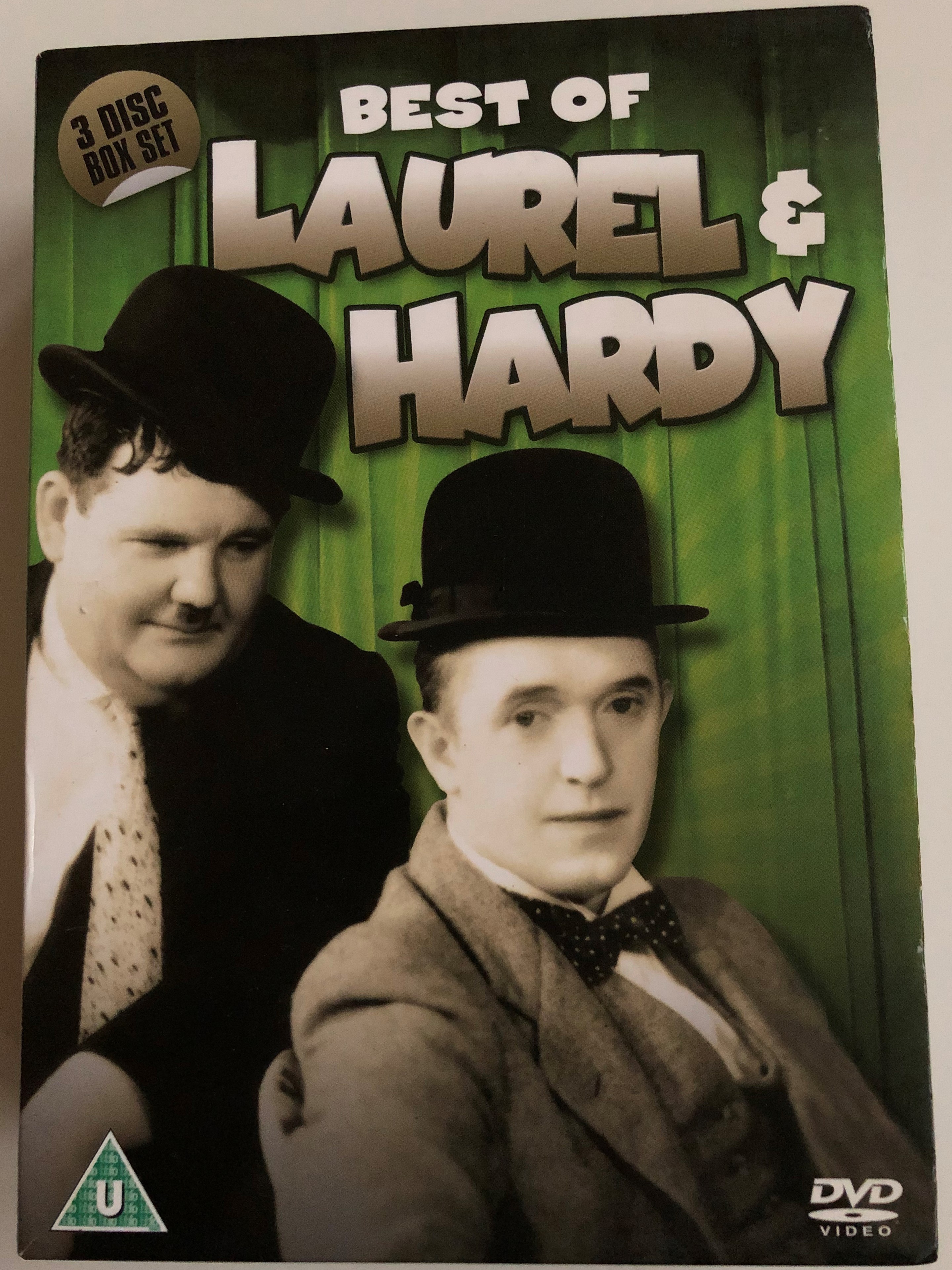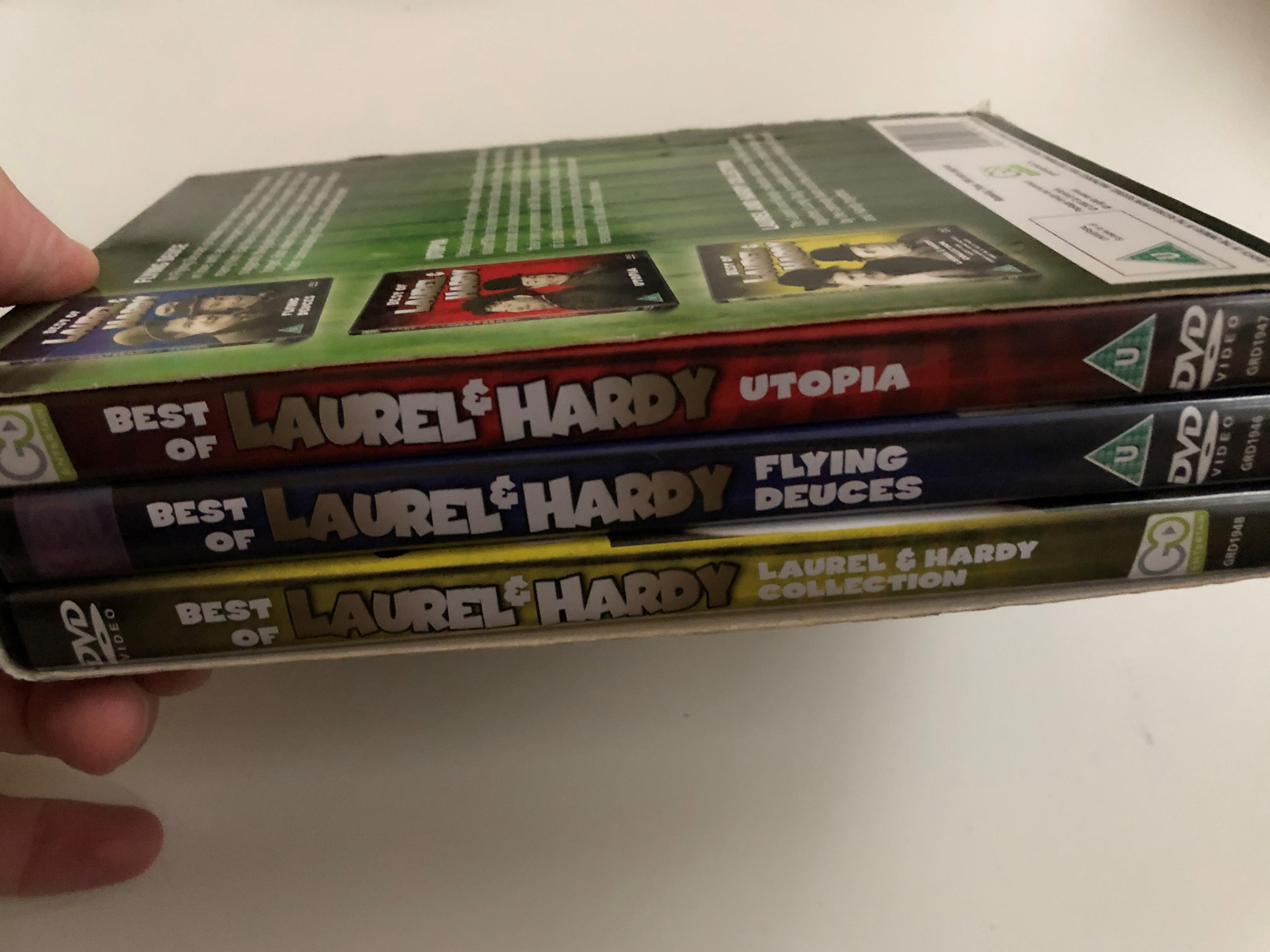Description
Best of Laurel & Hardy 3 DISC Box SET - A B&W Classic Comedy Collection
Product Information
- UPC: 5060144218575
- Product Type: 3x DVD Box Set
- Format: REGION 0 PAL DVD (All regions)
- Made In: EU
- Audio: English Mono
- Total Runtime: 82 minutes
Overview
The Best of Laurel & Hardy 3 DISC Box SET is a must-have collection for fans of classic comedy, featuring three iconic films: Utopia, The Flying Deuces, and The Lucky Dog. This compilation highlights the timeless humor and antics of the legendary duo, Stan Laurel and Oliver Hardy, who became household names during the early Classical Hollywood era.
Laurel and Hardy, known for their slapstick comedy, consist of Stan Laurel (1890–1965) and Oliver Hardy (1892–1957). Their comedic partnership blossomed in the late 1920s through the mid-1940s, charming audiences with their unique dynamic, where Laurel played the clumsy, innocent friend to Hardy's pompous character. Their signature tune, often referred to as "The Cuckoo Song," has become synonymous with their legacy.
Films Included in the Box Set:
DISC 1: Utopia (1951)
- Overview:
- In this final film starring the legendary comedy duo, Stan Laurel and Oliver Hardy, the story begins when Stan inherits a yacht and a small island from a wealthy relative. Encouraged by the prospect of owning their own paradise, the two set sail alongside a group of misfit companions on a dilapidated boat that can barely stay afloat. Their journey is riddled with mishaps, mechanical failures, and misadventures, and things get even more chaotic once they arrive on the island. Hoping to build a new utopia, their dream quickly devolves into political squabbling, environmental struggles, and classic slapstick disasters. While the film was produced under difficult conditions and received mixed reception at the time, it remains a notable part of Laurel and Hardy's film legacy for its themes of idealism clashing with human folly.
DISC 2: The Flying Deuces (1939)
- Overview:
- This wartime-era comedy follows Laurel and Hardy as they travel through Paris, where Ollie falls in love with a local woman. However, upon learning that she is already married, a heartbroken Ollie decides to join the French Foreign Legion to escape his troubles, dragging a reluctant Stan along with him. Once enlisted, the pair struggle with military discipline, foreign customs, and their own clumsiness, which leads to one misstep after another. Featuring memorable scenes such as their failed attempt to escape in a stolen airplane, the film is known for its blend of absurd humor and action. The Flying Deuces is considered one of the duo's most iconic sound films and showcases their enduring comedic chemistry, even in a more structured and cinematic setting.
DISC 3: The Lucky Dog (1921)
- Overview:
- Often recognized as the first screen pairing of Stan Laurel and Oliver Hardy, this silent short film is a historic milestone in comedy cinema. Although not officially a Laurel and Hardy vehicle at the time, the film features them interacting in comedic roles, with Stan portraying a hapless young man who befriends a stray dog. As the story unfolds, he crosses paths with a bumbling robber played by Ollie, leading to a series of encounters involving misunderstandings, physical gags, and a chase through the city streets. The film captures the early seeds of their comedic personas, with Stan’s wide-eyed innocence and Ollie’s pompous frustration. Though brief and simple by modern standards, The Lucky Dog offers a charming glimpse into the birth of a legendary comedy partnership.
Product Features
- Format & Dimensions: 3x DVD Box Set (Region 0, PAL - All regions)
- Audio: English Mono
- Total Runtime: 82 minutes
Interesting Facts
- Cinematic Milestone: This box set showcases some of the most significant works of Laurel and Hardy, capturing their comedic essence and impact on the film industry.
- Historical Significance: Released at the height of their popularity, these films reflect the duo's unique brand of humor, appealing to audiences across generations.
- Cultural Impact: Laurel and Hardy's work continues to influence modern comedy, and their films remain a testament to the art of slapstick and visual humor.
Hungarian Translation - Interesting Facts (Érdekes Tények)
- Filmtörténeti Mérföldkő: Ez a dobozos szett a Laurel és Hardy legfontosabb munkáit mutatja be, megörökítve komikus lényegüket és hatásukat a filmiparra.
- Történelmi Jelentőség: Népszerűségük csúcsán kiadott filmjeik a páros egyedi humorát tükrözik, vonzóvá téve őket a generációk számára.
- Kulturális Hatás: Laurel és Hardy munkái továbbra is befolyásolják a modern komédiát, filmjeik pedig a slapstick és a vizuális humor művészetének bizonyítékai.
Publishers
Published by [Insert Publisher Name], this 3-disc box set is a cherished collection that preserves the comedic legacy of Laurel and Hardy for fans of all ages.
We value your feedback! Share your experience with this product to help others make informed decisions. Your review is important to us!
Hashtags
English:
#LaurelAndHardy #ClassicComedy #Utopia #TheFlyingDeuces #TheLuckyDog #BlackAndWhiteFilm #ComedyCollection



















